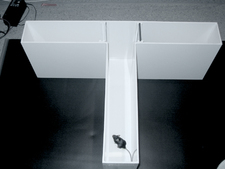-
Topics
subnavigation
Topics
Electromagnetic fields
- What are electromagnetic fields?
- Static and low-frequency fields
- Radiation protection relating to the expansion of the national grid
- High-frequency fields
- Radiation protection in mobile communication
Optical radiation
Ionising radiation
- What is ionising radiation?
- Radioactivity in the environment
- Applications in medicine
- Applications in daily life and in technology
- Effects
- What are the effects of radiation?
- Effects of selected radioactive materials
- Consequences of a radiation accident
- Cancer and leukaemia
- Genetic radiation effects
- Individual radiosensitivity
- Epidemiology of radiation-induced diseases
- Ionising radiation: positive effects?
- Risk estimation and assessment
- Radiation protection
- Nuclear accident management
- Service offers
-
The BfS
subnavigation
The BfS
- About us
- Science and research
- Laws and regulations
- BfS Topics in the Bundestag
- Links
Influence of static magnetic fields on emotional and cognitive behaviour
- Within a research project the development of emotional and cognitive behaviour in young male and female mice regularly exposed to magnetic fields of 7 Tesla during their whole embryonic development were investigated.
- This did not result in behavioural abnormalities or differences in emotional behaviour (anxiety, depression) or cognitive behaviour (working memory, long-term memory) in the young adult age.

![]() Mouse in a T-maze
Source: ZI Mannheim
Mouse in a T-maze
Source: ZI Mannheim
The research project "Effects of repeated exposures to strong static magnetic fields from MRI during embryonic development on cognitive and emotional behaviour in mice." ("Auswirkungen wiederholter Exposition mit starken statischen Magnetfeldern des MRT während der Embryonalentwicklung auf kognitives und emotionales Verhalten bei Mäusen") was carried out between 2008 and 2011 at the Central Institute of Mental Health in Mannheim, Germany. It was linked to the study on reproduction and development, focussing on the development of emotional and cognitive behaviour (anxiety, learning ability) in male and female young animals exposed during their embryonic development.
Studies in rodents enable to systematically examine both acute and long-term effects of exposure to magnetic fields. Particularly behavioural analyses may help detect even subtle effects of exposure to magnetic fields on the developing brain. This study focussed on the behaviour of young adult mice exposed to a static magnetic field of seven Tesla flux density during the entire period of their embryonic development for 75 minutes a day.
In numerous standardised behavioural tests for both emotional behaviour (anxiety, depression) and learning or memory, no behavioural alterations could be detected as a function of exposure. In contrast, gender-specific differences were found. This indicates high sensitivity of the tests which also permit to establish even slight differences. The results show that development of behaviour and learning ability in the young animals exposed during embryonic development was normal and the slight delay in physical development, as observed in the project on reproduction, had no further negative influence.
Although results from animal experiments cannot be completely transferred to man, the results suggest that MRI examination of pregnant patients does not affect healthy development of their children.
Summary
Exposure of mice to a magnetic field of seven Tesla per day over the total period of their embryonic development did not result in behavioural abnormalities or differences in emotional behaviour (anxiety, depression) or cognitive behaviour (working memory, long-term memory) in the young adult age.
State of 2018.07.27

